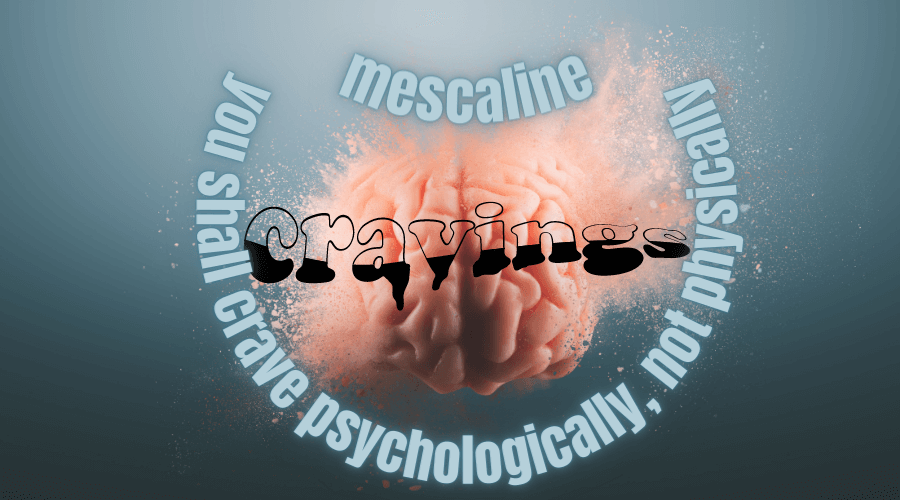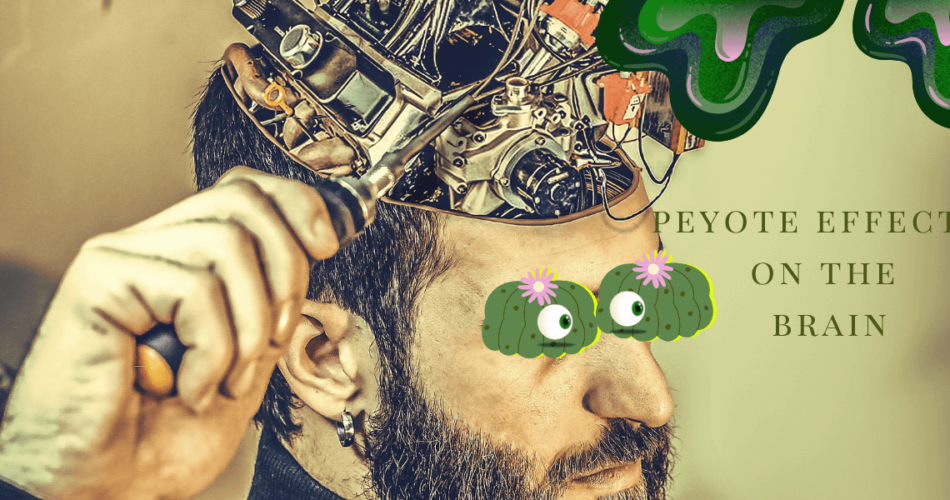Too Long; Didn’t Read
- Peyote cactus has psychedelic effects on the brain (think: visions, visuals, and hallucinations). This happens because mescaline interacts with our serotonin system. 🧠
- Peyote is known for conjuring profound visions. That’s why it’s been used in religious ceremonies for thousands of years. 🙏
- Sadly, if you frequently use the drug, it will affect your brain. You can become addicted, and experience flashbacks. 😿
Peyote Effects on the Brain
So, you’ve taken peyote. What happens next? A cascade of neurological activity within our brains! Mescaline (the primary psychoactive compound in peyote) interacts with the complex network of neurotransmitters responsible for regulating mood, perception, and cognition. In other words: peyote is like a colorful filter we put on the glasses our brain sees through. Mescaline alters the way our brain processes information, leading to vivid hallucinogenic effects.
Peyote effects on the brain are at the same time simple and complex. Simple because it works like LSD – it binds to the serotonin receptors. Complex because peyote primarily stimulates the 5-HT2A receptors, resulting in a shift in sensory perception and the generation of intense visual imagery.
How Does Peyote Use Affect Our Brains Long-Term?
The problem is that psychedelics are relatively new in academic fields. They haven’t been studied for long, so we’re not fully aware of the long-term peyote effects on the brain. But! We can assume what they will be like.
For example, we know that psychedelics aren’t usually addictive. But when we use peyote often, it will directly affect our serotonin system. Now, that will affect our mood, and cognitive function. The result? We will crave more mescaline psychologically, not physically.

General Effects of Peyote
We know how peyote cactus affects the brain. What does it look like in practice, though? Like a heck of a trip! Peyote effects on the brain begin more or less half an hour after we take the drug (but can also begin after an hour).
First, we usually feel our perception change. Sometimes it’s a bit blurry, sometimes it’s an interdimensional jump into transformed surroundings. We’re talking color changes, double vision, and morphing shapes. The peak happens around 2 hours into the trip, and that’s when the hallucinations will be at their strongest. What we see is often somehow connected to our emotions. Hence, the profound sense of connectedness, and spiritual exploration.
Time and space are no longer anchors to reality. Our very selves become a stream of consciousness. One of the peyote effects is the intensity of our feelings (what is funny, might seem hilarious; you get the gist). Don’t these sound simply delightful?
Editor’s Note ✨
The use of peyote and other psychedelic substances should always be approached with caution, respect, and in compliance with local laws. The Native American Church continues to use peyote sacramentally, recognizing its sacred significance and incorporating it into their spiritual practices.
What Are the Medicinal Effects of Peyote?
Not only does peyote affect our brains, it also affects our bodies. And, no, we’re not talking about things we see and feel. Peyote can help you heal yourself. More specifically, it can help with:
- Addiction: There is preliminary evidence suggesting that psychedelic substances, including mescaline, may have therapeutic potential in the treatment of certain addictions, such as alcoholism and substance use disorders.
- Mental health conditions: Psychedelics have shown promise in the treatment of various mental health conditions, such as depression, anxiety, and post-traumatic stress disorder (PTSD). Many individuals and researchers believe that peyote has these therapeutic effects as well.
- Cluster headaches: Some anecdotal reports suggest that mescaline alleviates cluster headaches, an extremely painful type of headache.
The Fascinating Phenomenon of Peyote Flashbacks
All psychedelics, including mescaline, are infamous for the possibility of flashbacks. Imagine it’s been a month since you took peyote, and all is well. And then, one day, as you’re eating your breakfast, you get a whiplash from your trip. Suddenly, you experience the peyote effects on the brain, as if they were happening right now. They aren’t inherently disturbing (some of them last only a few seconds, if not less). Yet, many people find them off-putting and disruptive to their daily routines.
Similar Posts:
- Mescaline vs Peyote Cactus: A Short Comparison
- How Long Does Peyote Last? Duration of a Mescaline Trip
- Mescaline vs. LSD – Let’s Compare These Popular Hallucinogens
- Peyote Trip: What Does It Look and Feel Like?
- The Marvel of Echinopsis Peruviana: Meet the Peruvian Torch Cactus, San Pedro and Peyote’s Mescaline Cactus Cousin
- Is Peyote Legal? Can You Cultivate It? | The Legal Status of Peyote
- How Much Is Peyote Worth? Cactus Controversial?

